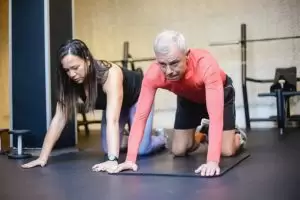Hip replacement surgery is a serious matter that can affect people of many different ages and conditions. At one time, senior citizens were the predominant group undergoing hip replacement surgery. However, it has become more common for younger, active people to have this operation done.
Several problems could arise that might cause hip replacement surgery to become an option. Hip and thigh pain, discomfort, and swelling as a result of arthritis are common reasons, as allowing these symptoms to grow could lead to significant issues. A broken hip or damaged hip joint can also lead to hip replacement surgery and can prevent future injuries of this sort.
These are only some common causes of hip replacement surgery being performed. Mid-County Physical Therapy is most concerned with helping patients recover from hip replacements. Our methods are specifically designed to satisfy each patient’s needs. Read on to learn more about how we can help you recover from hip replacement surgery.
What is a Hip Replacement?
Hip replacement surgery is a last resort for medical professionals to pursue, but it is often necessary. To perform this surgery, a surgeon will cut into the patient’s thigh and remove the damaged hip. In the space left behind, the surgeon replaces it with artificial pieces that can strengthen the affected area.
A patient could undergo multiple types of hip replacements, but the most common and intense is a total hip replacement. During hip replacement recovery, it is normal for patients to stay in the hospital for a few days. Though hip replacements are very safe, medical professionals and patients must be cautious to monitor any possible infections or other issues.

Physical Therapy Following a Hip Replacement
Physical therapy following hip replacement surgery can be extensive. It starts in a hospital setting and will gradually become centered on returning the patient to a sense of routine in their home environment. Patients will slowly learn to become more comfortable walking with their hip implants in place in the days following the surgery. After some time, the goal may be to step up and down the stairs slowly.
Later on, patients can begin performing more specialized, lower-body aerobic exercises to strengthen the artificial hip. Their progress in these exercises will go a long way in making the patient more comfortable with their implants. The key to this is having the process overseen by a professional who can show the patient proper exercise techniques.
After the patient becomes more settled in their home, they can, within reason, start performing some of the daily activities they did before their injury. The patient should go through this part of the process alongside the professionally overseen exercises. The progress made through the traditional physical therapy process can also help inform when to return to work.
In some rehabilitative situations, a physical therapist can come to the patient’s home to help assist them through outpatient therapy. It is generally good to check with a medical professional before taking on a new task at home while recovering. Having a physical therapist on-site can expedite the process.
Mid-County Physical Therapy Can Help You Recover
Mid-County Physical Therapy can help you make a full recovery after hip replacement surgery. Our medical professionals are caring experts in hip replacement physical therapy who consider each patient’s individual needs. You can trust our guidance as you navigate the complexities of recovery and physical therapy insurance.
If you or a loved one is about to undergo a hip replacement, consider using the services offered by Mid-County Physical Therapy. Call us today for more information on what we can provide.


